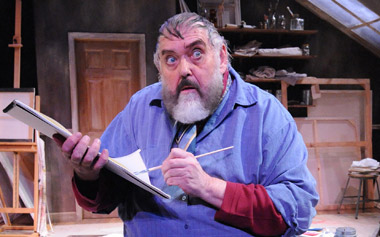Zero Mostel was a larger-than-life personality and an outsize talent. Jim Brochu is no featherweight either. As a youth, Brochu idolized that rhinoceros of an entertainer, then grew into a body that rivals Mostel’s impressive physique, and now has created a one-man show in which he, well, embodies the man. It’s a physically and vocally convincing impersonation that also captures Mostel’s capricious whimsy, stinging wit and, when faced with injustice, volcanic outrage.
Brochu’s Zero Hour is first out of the gate in the region’s summer theater season—which seems to get underway earlier each year, as companies jostle for exposure and audience share. If last week’s sold-out opening night was an indication, the public is more than ready for the party to begin.
In her curtain speech, Artistic Director Julianne Boyd drew a thematic line connecting this show to last year’s season closer, The Crucible, and two upcoming productions—The Best of Enemies, about the Civil Rights era, and Kunstler, a portrait of the radical lawyer—all of them dealing with issues of human rights.
Although Zero Mostel is best remembered as a comic actor and musical comedy star in such vehicles as A Funny Thing Happened on the Way to the Forum, Fiddler on the Roof and The Producers, he was also one of the most prominent targets of the McCarthyite witch hunts of the 1950s. An unapologetic leftist, he was blacklisted for 10 years, and Brochu reenacts part of Mostel’s craftily evasive testimony before the House Un-American Activities Committee. In Zero Hour, Mostel reserves his bitterest vitriol for a colleague who “named names” to the infamous committee: the director and choreographer Jerome Robbins, whom Mostel acknowledged as “a genius” but never forgave—and who, ironically, was later key to the success of both Forum and Fiddler.
The script gives as much weight to Mostel’s private life, including his upbringing as a child of Jewish immigrants and his adored wife Kathryn, as to his public career. But he shares some horror stories of the out-of-town tryouts of the two musicals, both of which he initially didn’t want to do and both of which nearly flopped, and dismisses The Producers in two brief sentences: “I hate that movie. I look like a beached whale.”
Zero Hour takes place in a skylighted studio lined with canvases. Mostel thought of himself as a painter first and foremost, an artist who happened to fall into acting. The show takes the form of an interview he gives to an unseen New York Times reporter, whom he tests with insults and then sketches as he talks.
Brochu gives a persuasive and an unfailingly entertaining rendering of his subject, a lumbering giant with darting eyes under beetle brows, teeth that literally gnash when he’s incensed (which is often), and an unpredictable ornery streak. The phone rings a couple of times, with his wife on the other end, and he waxes impatiently belligerent, as if ordinary chit-chat is beyond or beneath him. These moments reveal another side of the man who couldn’t help being bigger than life, even in the small things, and whose personal and political battles only fueled his exuberant genius.
Zero Hour: through June 5, Barrington Stage Company, Stage 2, 36 Linden St., Pittsfield, (413) 236-8888, barringtonstageco.org.



